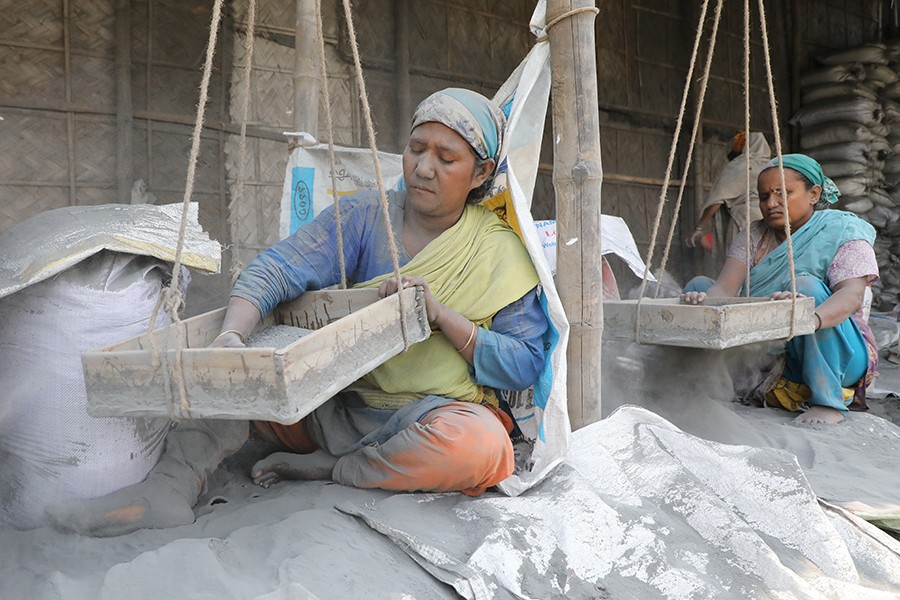Dalia Aktar (23) lost all hopes to lead a normal life when she returned home abused while working in Saudi Arabia.
She got her backbone and a leg fractured while trying to escape workplace by jumping from a three-story building in Saudi Arabia.
As she became physically disabled and had no money to after her in-laws and husband refuted to accept her when she returned home, she said.
When Dalia really had no hope to start anew, she got involved in a catering service named Dhrubotara.
Now she is dreaming to go a long way with this business that, she hopes, could change her life.
Like Dalia, a good number of returnee women migrant workers who were abandoned by families after coming back from abroad being abused have gotten new hope by establishing themselves as micro entrepreneurs.
They have built different types of small businesses by receiving funds from a number of development and non-governmental organisations. They are contributing to their families and children's education.
About formation of Dhrubotara, Dalia said it is founded by seven Saudi-returnee workers who were cheated by recruiters and tortured in different forms by their employers.
"BRAC provided all necessary supports including a grant of Tk 400,000 to start the catering service in October last year. We met all expenses to launch the business from the fund," Dalia said.
Dalia now works as the manager of the catering service while other six women have divided
among themselves other responsibilities such as procurement cooking food delivery etc, she said.
They are delivering about 100 lunch boxes to different markets and showrooms located at Uttara, Banani and Bishwa Road areas each day.
They have a plan to expand the business gradually and include more returnee women in this business.
Currently, they are keeping aside 2.0 per cent of their profit for giving support to other victim women workers, she said.
"My life did start with tragedies but it will end up with joy," Dalia said confidently.
Migrant rights campaigners said the authorities concerned should come forward to assist the returnee women workers. They underscored the need for making available necessary policy supports to help more returnee women workers establish themselves as entrepreneurs.
They said as the women workers are employed as domestic help abroad they gather upgrade skill on household works. But they can not match these experience in the country. So, entrepreneurship can help them for build livelihood.
Amena Akter (38), another Saudi returnee woman started a whole sale-cum-retail shop for supplying curd at Kamrangirchar area.
Two years back she planned to start the business by receiving life skill and entrepreneurship training from Ovibashi Karmi Unnayan Programme (OKUP).
She said "had I not found the necessary support, my life would have been ruined totally. I went to Saudi Arabia to change my financial condition but faced immense sufferings. I did not bring any money when I came back home", she said.
She launched the business with a capital Tk 140,000. Of the total amount OKUP provided Tk 22000 as seed money and rest of the amount she borrowed from a bank.
At present her monthly income is Tk 15000 from the business that helps her meet family expenses.
But she wants to expand the business as this income is not sufficient for meeting all the needs of her big family.
But she cannot do it due to unavailability of loans for such small businesses, Amena said.
"If I get fund then I can sustain in my business, otherwise it will be difficult to survive," she said adding that some of the returnee women workers also want to involve with business. But they also have no funds.
Shefali Begum (30) returned from Lebanon in 2018 also said she is struggling hard to continue her cloth business due to shortage of capital.
She started cloth business one year back with financial help with Tk 20000 and skill training from OKUP.
She now has a total investiable capital is only Tk 35000. So, she cannot buy necessary products to run her venture.
"I need at least Tk 100,000. If I get the money any financial institute with lower interests, then it can be very suitable for me," she said.
Because of workplace harassments, at least 10,000 female workers returned home from different countries of the Middle East in the last four years.
According to the welfare desk at Hazrat Shahjalal International Airport and rights activists, more than 1,500 domestic helps returned home from Saudi Arabia last year. They faced exploitations like denial of wages, sexual and physical assaults there.
Shariful Islam Hasan, head of BRAC's migration programme, said they so far have supported about 70 returnee women migrant workers to become small entrepreneurs.
They will continue their supports as much as possible. But the number of returned women is quite higher than their capacity to provide support.
So the government should institutionalise a reintegration programme for women returnee workers.
Women returnee workers can be provided with necessary training, fund, supports to start business or others income generating activities under the programme, he added.
OKUP chairman Shakirul Islam said they have so far provided training and seed money to 1000 victimised returnee women workers to start business since 2016.
His organisation has also kept the women under close monitoring. Besides, it provides necessary counselling and others supports to these workers so that they can sustain their business.
But the OKUP has no capability to give a large financial support to the workers. So the government should chalk out a comprehensive reintegration plan.
So that workers can avail income generating loans from different banks and financial institutions.
When contacted Wage Earners' Welfare Board (WEWB) deputy director Zahid Anwar said they will launch a pilot project on economic reintegration by this month.
Some 100 returnee male and 100 female workers will be brought under the programme in 15 districts.
About 0.9 million Bangladeshi women went abroad with jobs since 1991, officials said.


